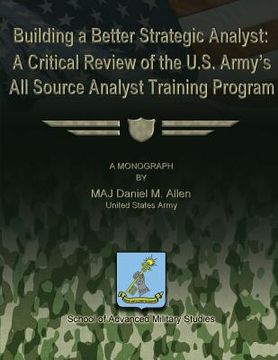Building a Better Strategic Analyst: A Critical Review of the U.S. Army's All Source Analyst Training Program
Synopsis "Building a Better Strategic Analyst: A Critical Review of the U.S. Army's All Source Analyst Training Program"
In the aftermath of September 11, 2001, the intelligence community saw a dark shadow cast across itself. Though the specific intelligence failures cannot yet be determined, there are some known pieces of information. The success of intelligence during the Cold War, a predictable bipolar war, resulted in a strategic intelligence system that supported the information requirements of that bi-polar world. Our intelligence analyst trained to use deductive skills to quantitatively determine the internal and external jostling of the bi-polar system. Since the end of the Cold War, America's adversaries have undergone significant transformation moving away from standing formation armies prepared for force on force battles. Rising from the ashes of the relatively predictable bi-polar global system are new networks and bands of ideologically and culturally motivated groups capable of exercising the power of globalization while taking advantage of both tacit and complicit state support. While US military analysts ardently constructed a mostly quantitative method of analysis to determine how former adversaries executed their game plan, the cultural complexities of the current global construct do not behave in manners friendly to this form of analysis beyond the local tactical level. Accordingly, senior intelligence analysts, in particular, now find themselves ill equipped to understand, much less predict, our nation's new real and potential adversaries. This monograph explores the development of intelligence analysts from their indoctrination through positions of senior intelligence analysts charged with scrutinizing strategic concepts and providing strategic recommendations. It compares current methodologies used to produce adaptive, effective senior intelligence analysts necessary for today's complex battlefields in non-Department of Defense agencies to those used within the United States Army. It seeks to answer the question: does the intelligence school in the United States Army prepare its intelligence analysts properly through training and education for roles as senior intelligence analysts? The results of this analysis identified three major observations. The first is that the current Army system does little to encourage individual innovation, imagination or creativity. The second is that the education, training, and evaluation system does little in the way of truly preparing an analyst for success in the senior analyst realm. Finally, the Army does not use the proper terminology for what it wants. The term analyst is reductionist and deductive by definition. The Army truly identified the need for an individual who can think deductively, inductively and abductively with the ability to synthesize all those ideas into something more predictive in nature. In short, the Army is not seeking an all source analyst as much as an all source "synthesist" or "fusionist". This is especially true in the strategic, senior intelligence analyst positions, helping to shape senior leaders' ideas of the situation the Army faces today and tomorrow.

